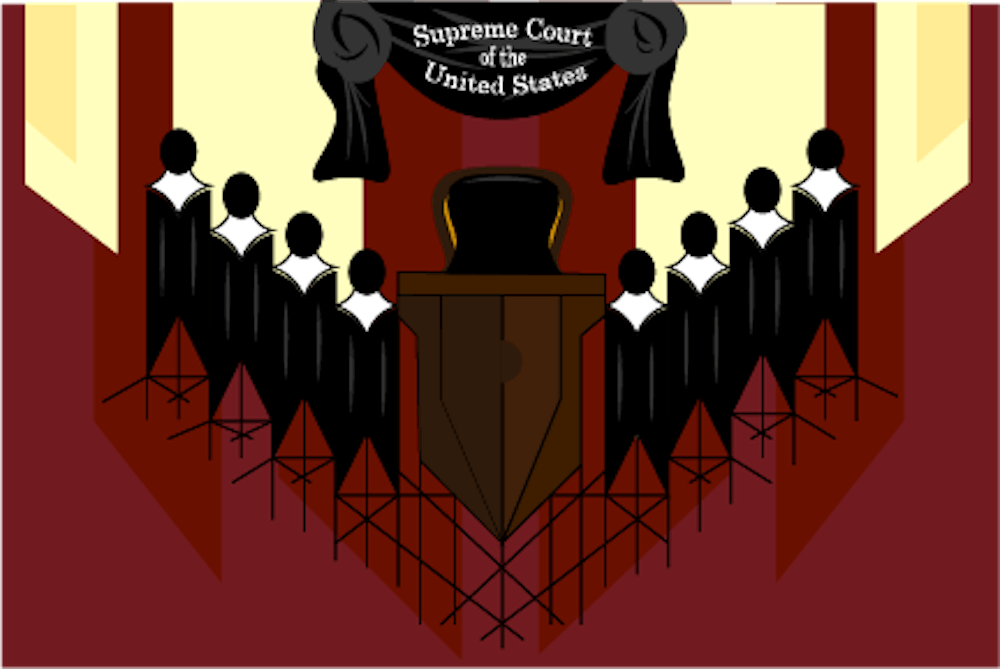A seat on the highest judicial court in the U.S. opened up after Supreme Court Justice Ruth Bader Ginsburg’s death on Sept. 18, and the battle to fill it has already begun.
The race to confirm a justice took off when President Donald Trump offered the seat to Amy Coney Barrett, a U.S. Court of Appeals judge and former law professor at the University of Notre Dame, less than 72 hours after Ginsburg’s death. But, with less than a month until the presidential election, Democrats are arguing that the Senate must wait until after the election to vote to confirm the nominee.
A similar situation happened in 2016, when Supreme Court Justice Antonin Scalia died nine months before the presidential election, but the Republican-controlled Senate denied confirmation until after the election took place, according to the Washington Post.
Although Ginsburg’s death occurred much closer to the coming election, Barrett's confirmation is still being pushed forward.
"The rules are in [Republicans'] favor," said Richard Dorman Jr., a third-year political science student and treasurer of USC's College Democrats. "They can do this, but, of course, Democrats should be protesting on the streets, should be calling them out in this great piece of hypocrisy."
Howard Stravitz, a professor at the USC School of Law, said although the Republicans' goal to confirm a new justice before the election is inconsistent with 2016, it is still within constitutional boundaries.
"I think this doesn't look good, but it is certainly within the constitutional power of both the president to make the appointment as it was for Obama, and it's within the constitutional power and obligation of the Senate to take up the appointment and consider it for confirmation," Stravitz said.
In order for a justice to be confirmed, a majority vote is required from the Senate, and because both the White House and Senate are ruled by Republicans, a confirmation is likely to happen.
Trump's appointee, Barrett, would swing the Supreme Court more conservatively, Robert Oldendick, a USC political science professor, said.
"This may change the direction of the court, so it's not just when it's occurring, but the fact that it is a very liberal justice passed away, Ruth Bader Ginsburg, and now is being replaced with a nominee who is at the opposite end of the spectrum, being a very conservative justice. So, that could change the tenure of the court and give the conservative justices a 6-3 advantage," Oldendick said.
Oldendick said landmark cases, such as Roe v. Wade, a landmark decision that gives women the right to choose when it comes to abortion, could be overturned under a conservative-leaning Supreme Court, and it might not be the only one.
"There's even some discussion now that with this change in the court that some recent Supreme Court rulings relating to LGBT rights may be overturned. So, there's a whole series of potential social issues that could be coming before the court in the next several years," Oldendick said.
Stravitz said he doesn't think Roe v. Wade will be directly overturned, though he thinks women's rights could be limited.
"What a lot of people don't understand is that states pass laws that are inconsistent with Roe v. Wade and a woman's right to choose and have an abortion, and they make it harder and harder and more and more restrictions, and the Supreme Court, particularly with Amy Coney Barrett, would likely uphold these regulations, undercutting Roe v. Wade and a woman's right to choose very substantially," Stravitz said.
Dorman said the Affordable Care Act could also be at risk when it is heard again on Nov. 10 if Barrett's nomination is approved, which is a decision he said he wouldn't support.
"Millions upon millions of Americans have continued to be able to get their healthcare through the markets that were set up through the Affordable Care Act," Dorman said.
Due to previous rulings, Barrett is widely supported by conservatives across the country, the New York Times reported.
"She is an extremely qualified candidate. I think that people should probably be excited that a woman would be replaced with a woman on the Supreme Court," said Spencer Stout, vice president of the USC College Republicans and third-year finance student.
Stout said Barrett's focus is on interpreting the Constitution contextually, rather than by political alignment.
"She is more focused about her history as an instructor and her interpretation of the Constitution and just making sure that people get it right, regardless of whatever the political skew might be that results from it," Stout said. "She is mainly just, kind of, an originalist. She is mainly just looking to uphold the Constitution as it was originally written."
Clarification (Oct. 12, 2020): A previous version of this article stated that Barrett was nominated to fill the vacancy less than 72 hours after Ginsburg’s death, but this is incorrect. Barrett was offered the position less than 72 hours after Ginsburg’s death but was not nominated until Sept. 26.

